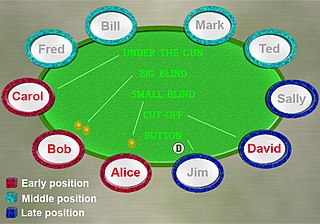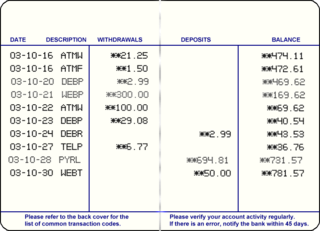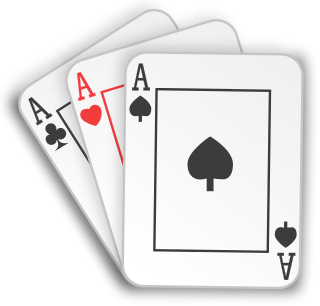
In the game of poker, the play largely centers on the act of betting, and as such, a protocol has been developed to speed up play, lessen confusion, and increase security while playing. Different games are played using different types of bets, and small variations in etiquette exist between cardrooms, but for the most part the following rules and protocol are observed by the majority of poker players.

Texas hold 'em is one of the most popular variants of the card game of poker. Two cards, known as hole cards, are dealt face down to each player, and then five community cards are dealt face up in three stages. The stages consist of a series of three cards, later an additional single card, and a final card. Each player seeks the best five-card poker hand from any combination of the seven cards: the five community cards and their two hole cards. Players have betting options to check, call, raise, or fold. Rounds of betting take place before the flop is dealt and after each subsequent deal. The player who has the best hand and has not folded by the end of all betting rounds wins all of the money bet for the hand, known as the pot. In certain situations, a "split pot" or "tie" can occur when two players have hands of equivalent value. This is also called "chop the pot". Texas hold 'em is also the H game featured in HORSE and HOSE.

Pay Day is a board game originally made by Parker Brothers in 1974. It was invented by Paul J. Gruen of West Newbury, Massachusetts, United States, one of the era's top board game designers, and his brother-in-law Charles C. Bailey. It was Gruen's most successful game, outselling Monopoly in its first production year. Pay Day is currently marketed by Winning Moves Games USA.

United States Treasury securities, also called Treasuries or Treasurys, are government debt instruments issued by the United States Department of the Treasury to finance government spending, in addition to taxation. Since 2012, the U.S. government debt has been managed by the Bureau of the Fiscal Service, succeeding the Bureau of the Public Debt.
A registered retirement savings plan (RRSP), or retirement savings plan (RSP), is a type of financial account in Canada for holding savings and investment assets. RRSPs have various tax advantages compared to investing outside of tax-preferred accounts. They were introduced in 1957 to promote savings for retirement by employees and self-employed people.
Future value is the value of an asset at a specific date. It measures the nominal future sum of money that a given sum of money is "worth" at a specified time in the future assuming a certain interest rate, or more generally, rate of return; it is the present value multiplied by the accumulation function. The value does not include corrections for inflation or other factors that affect the true value of money in the future. This is used in time value of money calculations.

A savings account is a bank account at a retail bank. Common features include a limited number of withdrawals, a lack of cheque and linked debit card facilities, limited transfer options and the inability to be overdrawn. Traditionally, transactions on savings accounts were widely recorded in a passbook, and were sometimes called passbook savings accounts, and bank statements were not provided; however, currently such transactions are commonly recorded electronically and accessible online.
A chit fund is a type of rotating savings and credit association system practiced in India, Bangladesh, Sri Lanka, Pakistan and other Asian countries. Chit fund schemes may be organized by financial institutions, or informally among friends, relatives, or neighbours. In some variations of chit funds, the savings are for a specific purpose. Chit funds are often microfinance organizations.
A consumption tax is a tax levied on consumption spending on goods and services. The tax base of such a tax is the money spent on consumption. Consumption taxes are usually indirect, such as a sales tax or a value-added tax. However, a consumption tax can also be structured as a form of direct, personal taxation, such as the Hall–Rabushka flat tax.

A personal budget or household budget is a plan for the coordination of income and expenses.
An osusu is a form of rotating savings and credit association found in Africa, for microfinancial capital accumulation. Osusus are the regional version of what in other places are called susus, tandas, or by other names. They are small groups such as in Sierra Leone 'where, for example, ten people put Le 5,000 in a pot and then one of the ten takes the resulting Le 50,000 for his or her own use, promising to put in Le 5,000 at the next group meeting to continue the process.' The word 'osusu' has its origin the Yoruba word 'Esusu' which means rotational savings.

Teen patti is a gambling card game. Teen Patti originated in India and is popular throughout South Asia. It originated in the English game of three-card brag, with influences from poker. It is also called flush or flash in some areas.

Cash games, also sometimes referred to as ring games or live action games, are poker games played with "real" chips and money at stake, often with no predetermined end time, with players able to enter and leave as they see fit. In contrast, a poker tournament is played with tournament chips worth nothing outside the tournament, with a definite end condition, and a specific roster of competitors.
The Public Provident Fund (PPF) is a voluntary savings-cum-tax-reduction social security instrument in India, introduced by the National Savings Institute of the Ministry of Finance in 1968. The scheme's main objective is to mobilize small savings for social security during uncertain times by offering an investment with reasonable returns combined with income tax benefits. The scheme is offered by the Central Government. Balance in the PPF account is not subject to attachment under any order or decree of court under the Government Savings Banks Act, 1873. However, Income Tax & other Government authorities can attach the account for recovering tax dues.
A rotating savings and credit association (ROSCA) is a group of individuals who agree to meet for a defined period in order to save and borrow together, a form of combined peer-to-peer banking and peer-to-peer lending. Members all chip in regularly and take turns withdrawing accumulated sums.
The following is a glossary of poker terms used in the card game of poker. It supplements the glossary of card game terms. Besides the terms listed here, there are thousands of common and uncommon poker slang terms. This is not intended to be a formal dictionary; precise usage details and multiple closely related senses are omitted here in favor of concise treatment of the basics.
In Latin America, a tanda is the regional version of a rotating savings and credit association (ROSCA). It is a form of a short-term no-interest loan among a group of friends and family.
Income drawdown is a method withdrawing benefits from a UK Registered Pension Scheme. In theory, it is available under any money purchase pension scheme. However, it is, in practice, rarely offered by occupational pensions and is therefore generally only available to those who own, or transfer to, a personal pension.
Hui refers to a group-based rotating saving and credit scheme that is popular among many immigrant and migrant communities throughout the United States, Taiwan. Biao Hui is the Chinese verb when someone is engaging or participating in Hui.
Gam'eya or jameya is a form of rotating savings and credit association (ROSCAS) used in over 89 countries and communities, particularly in the Middle East. It operates when a group come together and contribute a fixed monthly amount into a common pot, each person takes a turn taking all the money at the end of each month. It is also referred to as a chit fund in India and a tanda in Mexico.







